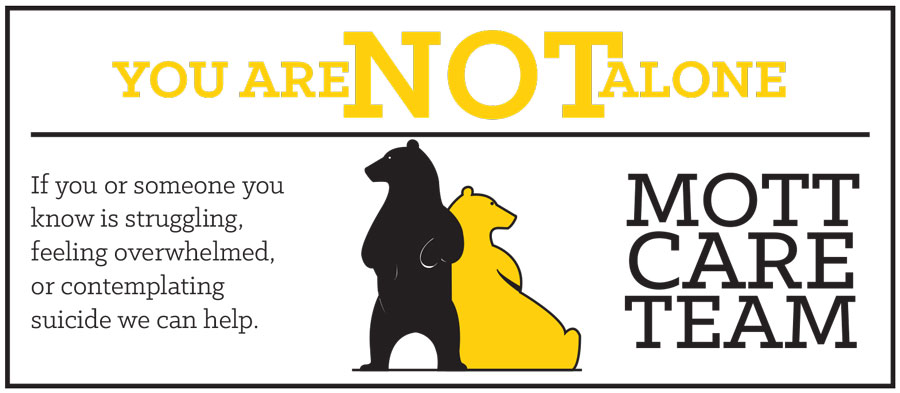MCC’s Care Team cares about students’ academic, emotional and physical success. The MCC CARE Team was established and designed to accept anonymous referrals regarding individuals in distress or whose behavior raises mental health concerns, student's safety and well-being or that of others. The MCC CARE Team addresses behaviors and/or mental health conditions that may be disruptive, harmful or pose a direct threat or risk to the health and safety of the Mott Community College community.

| Mott Community College Public Safety | 810-762-0222 |
| Genesee Health System 24-hour Crisis | 810-257-3740 |
| National Suicide Prevention Lifeline | 1-800-273-TALK (8255) |
Recognizing concerning behaviors or mental health challenges can be difficult. Students in distress or analyzing indicators of concerning behavior may present themselves in subtle or indirect manners. For example, concerning behaviors or mental health challenges may manifest verbally, physically, or in writing (such as in an email, drawing, or via social media).
The following listing of concerning behaviors are some examples that may be indicative of a student in distress and may lead you to reporting a concern to the CARE Team:
Please note – Students in a crisis situation should be escorted to the MCC Counseling Center and/or the Department of Public Safety. Additionally, if students pose an immediate threat to the health and safety of themselves or others, please contact the Department of Public Safety at (810) 762-0222 for immediate resolution and assessment of compliance reporting requirements.
If you, or someone you know, have experienced mental health challenges, or show signs of concerning behaviors, we encourage you to report this concern or call (810) 762-0331. However, if this concern is at the level of self-harm or harm to other, we advise you to contact Public Safety at (810) 762-0222
The MCC Care Team’s mission is guided by the core values of autonomy, respect, self-care, and prioritizes the shared responsibility of safety towards the individual and college community. With respect to these core values, the MCC Care Team engages in proactive, supportive, and collaborative approaches with internal and external community partners to identify, assess, and mitigate risks associated with students who exhibit concerning behaviors or thoughts.
The MCC Care Team vision includes the following three foundational areas:
The Care Team will identify and proactively support students based on data-driven trends in behaviors, or foreseeable educational or environmental changes that could negatively impact student success.
The Care Team will work collaboratively with the college community and partners to gather relevant data; analyze and evaluate relevant data; provide supportive intervention strategies and intentional follow-up in a structured and supportive environment.
The MCC Care Team will provide preventive educational information and training to the college community regarding the identification of concerning behaviors, supportive strategies, and appropriate referral protocols.
The MCC Care Team goals include the following:
The MCC Care Team’s scope of service is guided by the mission, vision, and goals. This includes providing short-term education focused personal counseling to individual students faced with personal challenges, concerning behaviors and/or circumstances that have negatively impacted the mental health and wellness of our students. Additionally, it is within the scope of the MCC Care Team to provide proactive presentations and training to the college community to support our student’s academic, career, and personal success and achievement.
To request MCC Care training for you, your department or division, please submit this form and contact Counseling and Student Development at (810) 762-0331
Early recognition and treatment of mental health disorders offers the best opportunity for recovery. This anonymous and confidential screening tool is designed to help students examine any thoughts or behaviors that may be associated with depression, generalized anxiety disorder, bipolar disorder, substance abuse, eating disorders, or posttraumatic stress disorder.